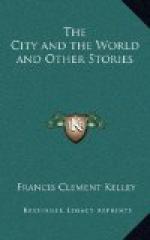With swift strokes Deschamps paddled down the St. Lawrence, through the rocky entrance to the Saguenay, and over its dark waters till a harbor was reached in a cleft of the coast. Here the madman landed, climbed to the summit of the rock, and laying down the boy, kindled a fire of driftwood. “I may see his face,” he muttered. “The last of my line! The English cross shows! The strain shows! I must wash it out! Hush, my little one, thy grandfather guards thee; soon shalt thou sleep in my arms—arms that cradled thy father, and shall hold thee forever. I, who was ever gentle, who spared the birds and beasts, and sorrowed with the trapped beaver, will spare thee, too, my baby—will save thee from thy father. Here where the wind speaks of freedom; here where the river even in its anger, as to-night, whispers peace; here where Deschamps worked and hoped; here where Deschamps sorrowed and mourned; here, little one, shall we rest together. Child, for you and me life means disgrace; the better part is death and freedom.”
A leap from the rock! The baptismal robes, fluttering white like angels’ wings, dipped to the surface and disappeared. The race of Deschamps was ended. The black water of Saguenay was its pall, the storm its requiem.
THE THOUSAND DOLLAR NOTE
The three men who sat together around the little library table of the Rectory felt the unpleasant tension of a half-minute of dead silence. The big burly one, with his feet planted straight on the carpet, passed his tongue over his lips and nervously folded and opened the paper in his hands. The tall young chap with creased trousers kept crossing and re-crossing his legs. Neither of them looked at the young priest, who ten minutes before had welcomed them with a merry laugh and had placed them in the most comfortable chairs of his little bookish den, as cordially as if they were the best friends he had in the world. Now the young priest looked old and the half-minute had done it. He was just an enthusiastic boy when the contractor and architect arrived; but he was a care-filled man now, as he sat and nervously passed a handkerchief over his forehead, to find it wet, though the room was none too warm. He seemed to be surmounting an actual physical barrier when he spoke to the big man.
“I do not quite see, Mr. McMurray” (it had been “John” ten minutes before), “I do not quite see,” he repeated anxiously, “how I can owe you so much. You know our contract was plain, and the bid that I accepted from you was six thousand eight hundred dollars.”
“Yes, sur; yes, sur; it was, sur,” answered McMurray with shifting embarrassment, “but you know these other things were extras, sur.”
“But I did not order any extras, Mr. McMurray,” urged the priest.
“Yes, sur; yes, sur, you did, sur. I told you the foundations was sandy, sur, and that we had to go down deeper than the specifications called fur. It cost in labor, sur,”—McMurray did not seem to be enjoying his explanation—“fur diggin’ and layin’ the stone. Then you know, sur, it takes more material to do it, sur. You said, yes—to go ahead, sur.”




